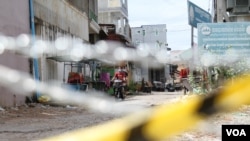Phnom Penh City Hall will continue to use a three-color zone system to control the spread of COVID-19 in the capital and officials have lashed out at critics who say the measures, especially in red zones, have resulted in food shortages.
The municipal administration officials lifted lockdown measures that were announced on April 15 and will keep in place the designation of red, orange, and yellow zones in the city. The new zones released on Wednesday have resulted in a reduction of red zones with City Hall saying it wanted more targeted restriction to bring down the case count.
A night curfew from 8 p.m. to 3 a.m. remains in place and dine-in at restaurants and alcohol sales are still prohibited.
Deputy Phnom Penh Governor Keut Chher urged people to follow preventive health and administrative measures announced by City Hall. He asked people in red and orange zones to remain patient with authorities.
“We are already aware that all of you living in the red zone and the orange zone will face difficulties because the [lockdown] will continue, but we don’t have any choice besides this lockdown to protect the lives of others,” he said.
Residents in red zones are prohibited from leaving their homes except in medical emergencies. All business activity, including at public markets, are banned and the government has taken up the responsibility of providing food and essential items to citizens in red zones.
This has led to food shortages in red zones with rights groups urging the government to ensure equitable distribution of food. Local authorities have rejected these accusations and said protests asking for food aid were politically motivated.
Keut Chher said critics of the government’s lockdown measures only “shouted opposing views” and were not helping the government save people from food shortages.
“When we talk about this group, we don’t want to say much because they don’t spend any time with us and [they] never join us,” he said at the same press conference. “Let’s ask them if they do anything? Nothing!”
He also mocked critics for not having the courage to go in and distribute aid to people facing food shortages in the red zones. But, Human Rights Watch has criticized the Cambodian government for blocking United Nations agencies and other aid groups from accessing red zones.
A Human Rights Watch statement from May 5 reported that 300,000 people had been affected by restrictions placed in red zones.
“Many have not been able to get food, medicine, and other necessities for weeks. Local and international groups have expressed their readiness to assist directly to those most affected, but the authorities have denied them access,” the statement reads.
Theng Savoeun, who heads the Coalition of Cambodian Farmer Community, said municipal authorities should listen to their critics and work to better assist people facing food shortages regardless of their political affiliations. Apart from food shortages, he said residents in red zones were concerned about paying rent and utility bills because they had lost income due to the stringent lockdown measures.
“What they are worried about is the payments, which means [they] have no money to pay rent, water, and electricity bills,” he said. “If the lockdown continues, the Phnom Penh administration, as well as the [national] government, must consider giving them special assistance.”
